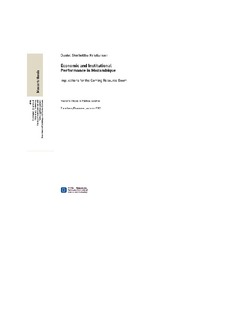Economic and Institutional Performance in Mozambique: Implications for the Coming Resource Boom
Master thesis
Permanent lenke
http://hdl.handle.net/11250/268770Utgivelsesdato
2013Metadata
Vis full innførselSamlinger
Sammendrag
The resource curse literature predicts how both aid and natural resources leads to real appreciation, hurting competitiveness and disfavoring the producing sector, which is bad news for a nation at the outset of its industrial buildup. Furthermore, a resource boom might lead to undesired behavior undermining national institutions – bearing implications of a “double resource curse”. Mozambique is an aid-dependent nation now facing the outbreak of a resource boom, as recent natural gas discoveries bring potential for transforming one of the world’s poorest countries to one of the world’s largest natural gas exporters within decades. The literature provides us with expectations of such successful transformation being dependent on both sound economic and institutional development.
This study aims to uncover whether there are symptoms of Dutch Disease in the Mozambican economy, by tracking real appreciation through calculating effective exchange rate indices for the time period of 2002-2012 as well as analyzing sectoral development over the same time span. In continuation, we track institutional development in Mozambique with time-series data of institutional indicators developed by the World Bank. We find that institutions are weak and we observe signs of deterioration coupled with massive gas discoveries in recent years. The national economy is growing, and we cannot find signs of large shifts in sector development. However, the real exchange rate has appreciated in recent years. While the cause of this is not explained by our deployed literature, we find it interesting that fluctuations in foreign direct investments shows signs of correlation with the real exchange rate. The impact of FDI on developing economies will serve a potent variable for further research within resource curse frameworks.
